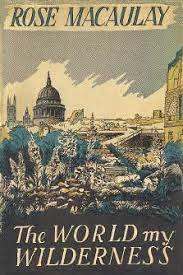Luckily, you don't have to wait for me, as I've found an essay on the novel by Lucy Scholes for The Paris Review.
The novel opens in France in 1946, where 17-year-old Barbary and her younger step-brother Raul have grown wild from running with the Maquis. Their mother decides to send them to live, separately, with relations in London in an attempt to civilise them.
Scholes describes what happens next:
Later, in London, they escape their homes and their guardians, hiding from the police in the blitzed ruins of Cheapside. This uninhabited no-man’s-land is "a wilderness of little streets, caves and cellars, the foundations of a wrecked merchant city, grown over by green and golden fennel and ragwort, coltsfoot, purple loosestrife, rosebay willow herb, bracken, bramble and tall nettles, among which rabbits burrowed and wild cats crept and hens laid eggs."
It’s here among the "dripping greenery that grew high and rank, running over the ruins as the jungle runs over Maya temples, hiding them from prying eyes," that Barbary finds what Macaulay, in a letter about her novel to her friend Hamilton Johnson, calls the girl’s "spiritual home." These "broken alleys and caves of that wrecked waste" offer the traumatized, homesick Barbary a safe haven: "It had familiarity, as of a place long known; it had the clear, dark logic of a dream; it made a lunatic sense, as the unshattered streets and squares did not; it was the country that one’s soul recognised and knew."
Barbary and Raoul swear their loyalty to fringe groups - first the Maquis in Provence, then the ragtag band of deserters, thieves, and black marketers they meet in London. They are united by their refusal to adhere to convention, law, and order. In the novel, tradition is juxtaposed with modernity. The annihilation of Barbary and Raoul’s childish innocence, and of society’s outdated Victorian sensibilities, is shown alongside the destruction of culture and civilization that the war has wrought.
It is the exotic landscape I remember most from The World My Wilderness. We are told that London after the war was grey and miserable, but here the city has lush vegetation at its heart and new vistas of Italianate churches opened up by enemy bombing.
Don't wait for me: read the book yourself.

No comments:
Post a Comment